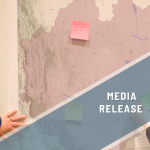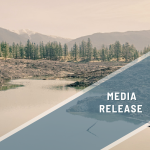Building the Next Generation of Water Stewards
Young people today are growing up surrounded by the realities of climate change – living through water restrictions, breathing wildfire smoke, and seeing the global impacts daily through social media. It’s no wonder youth across Canada and around the world are disproportionately feeling the mental health toll of the climate and ecological crises, facing higher rates of concern about their futures.
One of the best ways to address climate anxiety is to empower youth to take action. As the next generation inherits the challenges already reshaping our watersheds, they will be responsible for making tough decisions about how water is managed and shared. By equipping them with the skills and knowledge to protect freshwater, we can help them build a more resilient future.
That’s the vision behind Watershed Matters, a collaborative educational program between Living Lakes Canada and Wildsight. The program engages high school students in understanding watershed management as both a science and a complex social and environmental issue. It moves beyond simply learning about water to building the skills to respond to watershed management challenges with careful consideration, creativity, and fairness.
“Most students see water as an infinite resource in B.C.,” said Trevor Marzke, a teacher at Kootenay River Secondary School in Creston, who brought the program to his class. “We have water restrictions from time to time, but rarely have students not been able to access drinking water. I think the realization that this resource is finite and shared might make them more aware of how precious it is.”
The program combines classroom learning with an immersive field experience. In class, students tackle challenging questions: Who should have priority when water is scarce? How can we balance human needs with ecosystem health? And how can water management adapt to the disruptions of a climate-impacted world? In the field, students gain hands-on experience measuring streamflow (water quantity) and conducting water-quality tests: dissolved oxygen, pH, nitrates, and phosphates, key indicators of watershed health.
“It was great to consider how us teenagers can contribute to keeping our water healthy and our ecosystem viable for all to thrive,” said Grade 12 student Rae from Mt. Sentinel Secondary School, South Slocan.
By teaching scientific literacy, critical thinking, and collaborative problem-solving as interconnected skills, Watershed Matters empowers youth to become active stewards of their watersheds. Students take on new knowledge and a deeper appreciation of the role they can play in shaping a sustainable, water-secure future.
Watershed Matters is currently being delivered across the B.C. Columbia Basin. Learn more about the program in this 6-minute introduction video:
Photo Gallery
Thank you to our generous funders for supporting this program:









